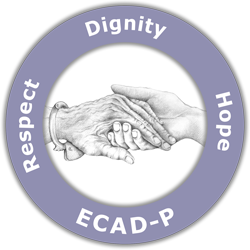Developing and Testing E-Training to Enhance Care of Aged and Dying Prisoners
Klein Buendel (KB) collaborator, Susan Loeb, PhD, RN, described the development and testing of computer-based training for corrections staff on caring for aged and dying prisoners in a poster she presented at the National Commission on Correctional Health Care (NCCHC). The conference was held in Las Vegas, NV from October 20-24, 2018.
The Enhancing Care of the Aged and Dying in Prisons (ECAD-P) training program is a collaboration between KB and Penn State University. The research team, which includes KB Senior Scientist, Dr. Valerie Myers and KB’s Creative Team, built upon electronic file training materials that had been developed at Penn State University, and transformed them into interactive computer-based training that is relevant to a broad spectrum of correctional staff.
Approaches employed in an earlier phase of this research included: (a) engagement with an Expert Advisory Board, including representatives from corrections, geriatrics, and hospice; (b) a Community Advisory Board constituted by corrections officials and returning citizens; (c) an environmental scan conducted with corrections training officers and information technology staff; (d) a modified Delphi survey with geriatric and corrections nurses; and (e) initial in-person usability testing of an early version of three training modules. In a second phase, usability testing of six modules was conducted in a large jail in the Northeast and a State Correctional Institution in the Midwest.
Analytic approaches employed throughout this research included content analysis, geriatric content identification, and acceptability, feasibility, and usability evaluation using qualitative observation approaches and the System Usability Scale. The Phase I study established proof of concept, produced three prototypical modules, a drafted a detailed specifications document for full program development in Phase II. Phase II included refinement of Phase I learning modules and development of three additional modules. Phase II assessments showed that the program is acceptable, feasible, and usable in corrections.
The NCCHC poster concluded that correctional settings across the United States face growing demands to better address the health care and management needs of aged, chronically ill, and dying inmates. The ECAD-P computer-based training holds promise to contribute to better preparation of correctional staff to effectively care for these populations.
This research was funded by a Small Business Technology Transfer (STTR) grant to KB from the National Institute on Aging at the National Institutes of Health (AG049570; Dr. Susan Loeb and Dr. Valerie Myers, Multiple Principal Investigators). Collaborators/coauthors in addition to Dr. Loeb and Dr. Myers include Dr. Erin Kitt-Lewis from the Penn State University College of Nursing.

